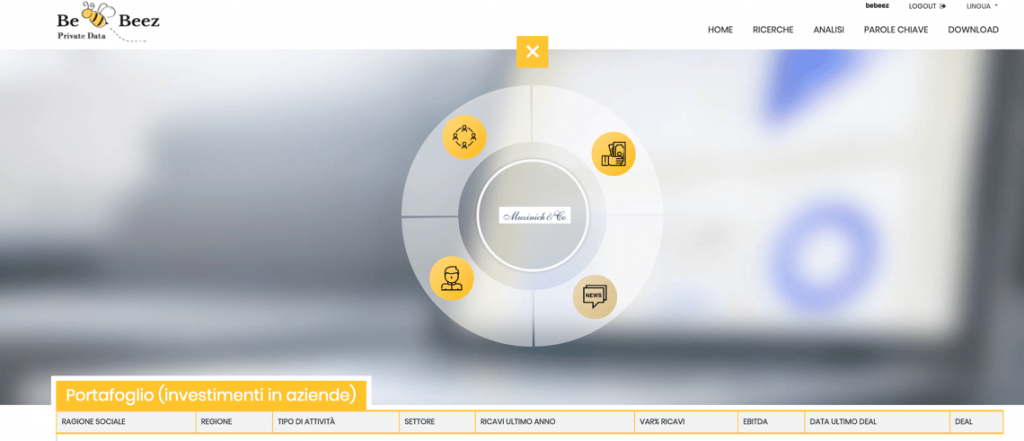
American asset management boutique Muzinich & Co. specialized in corporate credit announced yesterday the final closing of a new pan-European private debt fund over its 600 million euros target, at 706.5 million euros.
The fund was raised with institutional investors, as well as the other closed-end funds managed by Muzinich, but the US investment house will soon also launch Eltif (European Long Term Investment Fund, see here a previous post by BeBeez), entering in the trend seen by many asset managers in Europe working to channel the long-term savings of private banking customers on the real economy and in particular on private capital.
This was announced yesterday by the founder of the company George Muzinich, the country manager Domenico Del Borrello, the global head of capital markets strategy Fabrizio Pagani (former head of the technical secretariat of Italy’s Ministry of the Treasury, when the ministry was led by Pier Carlo Padoan) and the managing director Filomena Cocco (see the press release here).
Just recently Eurizon launched the first Italian Eltif (see here a previous post by BeBeez). It is no coincidence that during the conference organized yesterday afternoon by Muzinich at Palazzo Mezzanotte in Milan on the issue of supporting the growth of SMEs, one of the round tables featured some of the leading asset managers active in Italy in the investment funds segment dedicated to retail customers. At the round table spoke Gianmaria Mossa (ceo of Banca Generali), Paolo Federici (head of UBS’s wealth management) and Paolo Molesini (ceo of Fideuram). The latter has also announced that in recent days the possibility has been reopened for Fideuram private banking customers to subscribe the Fideuram Alternative Investments fund – Global Private Markets, a closed fund dedicated to investments in private multi-asset markets (private equity, private debt, infrastructure and real estate) and intended for non-professional customers, who at the beginning of January had announced a closing at 384 million euro stake (see here a previous post by BeBeez). Molesini has specified that the new collection window will remain open until next March 15th.
The new pan-European private debt fund raised by Munzinch will invest in the debt of SMEs with ebitda between 3 and 20 million euros located in Italy, Great Britain, France, Germany, Austria, Switzerland, Scandinavia, Benelux, Iberia and Ireland. The fund will allocate the capital in the form of senior, unit, mezzanine, junior loans and with the option for some equity investments, with the aim of financing growth, acquisitions and international expansion. The company, which for this new pan-European vehicle had an investment target of between 500 and 700 million, had already completed a first closing of the fund for 180 million euros in 2018.
George Muzinich claimed to have been among the few to have invested in the debt of the companies in Italy back in 2012 and still being optimistic. Actually, despite the difficulties, Italian entrepreneurs are resilient, flexible, able to adapt, Mr. Muzinich said. For this reason the asset manager, despite the winds of recession, intends to increase its investments in Italy and with the new fund it will be able to invest also in equity.
However, the new fund will never have a private equity approach. If it decides to invest in the equity of SMEs, it will do so alongside debt, which may perhaps be issued at cheaper rates for companies, precisely in exchange for a potential upside provided by the shareholding.
Muzinich launched in Italy in 2014 the first private debt fund Muzinich Italian Private Debt Fund (see here a previous post by BeBeez) with a budget of € 286 million, which is now fully invested. Last year, the US asset manager bought Springrowth sgr (see here a previous post by BeBeez), which launched a direct lending fund that today has a budget of € 210 million.
At the conference the former Minister of Economy and Finance Pier Carlo Padoan also spoke, raising he alarm on the sudden stop to corporate investments from mid-2018 onwards, responsible for the Italian technical recession. A stop generated by the increase in the Btp versus Bund yields spread and by the drastic drop in the level of business confidence and which could in turn have medium-term consequences on our growth capacity. According to Mr. Padoan, “Italy should strike a balance between a fiscal policy that contains the debt and the provision of investment for businesses.” The former minister approves the recent incentives to invest in the real economy introduced by the Italian Government, but invites the Government not to introduce excessive limits with their reform, while noting that the elimination of some other incentives to reinvestment of profits has not followed a new instrument that replaces it.
Following, Stefano Firpo, DG for industrial policy, competitiveness and SMEs at Italy’s Ministry for Economic Development, recalled the difficulties and powerful resistance that he found when he was working at the reform of the financial system since 2012, despite the credit crunch then in place. Resistances that were manifested also for the instruments that did not go against the banks, but that had to be implemented together with them. “The Italian financial industry is still small and isolated, it is not modern or even structured”, concluded Firpo.
In this regard, the ceo of the Italian Stock Exchange, Raffaele Jerusalmi, said that Italy starts from a position of underdevelopment in terms of listed companies. Today there are only 440 listed companies in Milan and represent less than 40% of the Italian GDP in terms of overall capitalization. Borsa Italiana is trying to change the culture in Italy to make it less hostile to the market, but on a global level today indexing and excessive regulation are reducing prices. Meanwhile, said Jerusalmi, given the success of investment trusts in the United Kingdom, with a collection of 150 billion, Borsa Italiana is trying to develop its Miv segment.
Muzinich & Co is one of the private capital investors monitored by BeBeez Private Data
(find here how to subscribe to the Combo version, which includes BeBeez News Premium 12 months for only € 110 per month)



